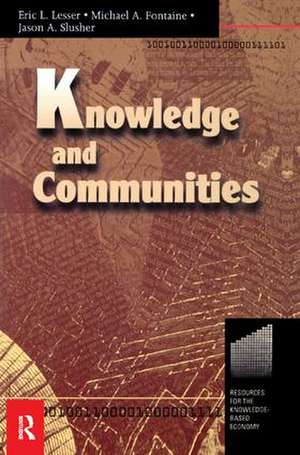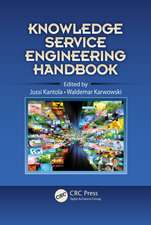Knowledge and Communities
Autor Eric Lesser, Michael Fontaine, Jason Slusheren Limba Engleză Hardback – 28 iul 2017
| Toate formatele și edițiile | Preț | Express |
|---|---|---|
| Paperback (1) | 222.94 lei 5-7 săpt. | |
| Taylor & Francis – 13 sep 2000 | 222.94 lei 5-7 săpt. | |
| Hardback (1) | 1014.74 lei 6-8 săpt. | |
| Taylor & Francis – 28 iul 2017 | 1014.74 lei 6-8 săpt. |
Preț: 1014.74 lei
Preț vechi: 1366.53 lei
-26% Nou
Puncte Express: 1522
Preț estimativ în valută:
194.20€ • 202.21$ • 164.12£
194.20€ • 202.21$ • 164.12£
Carte tipărită la comandă
Livrare economică 10-24 martie
Preluare comenzi: 021 569.72.76
Specificații
ISBN-13: 9781138435124
ISBN-10: 1138435120
Dimensiuni: 152 x 229 mm
Greutate: 0.45 kg
Ediția:1
Editura: Taylor & Francis
Colecția Routledge
Locul publicării:Oxford, United Kingdom
ISBN-10: 1138435120
Dimensiuni: 152 x 229 mm
Greutate: 0.45 kg
Ediția:1
Editura: Taylor & Francis
Colecția Routledge
Locul publicării:Oxford, United Kingdom
Public țintă
Professional Practice & DevelopmentCuprins
Part 1 Practical Applications; Chapter 1 Communities of Practice, Etienne Wenger; Chapter 2, Richard McDermott; Chapter 3, William Q. Judge, Gerald E. Fryxell, Robert S. Dooley; Chapter 4 Communities of Practice, David Stamps; Chapter 5, John Storck, Patricia A. Hill; Chapter 6, Arthur Armstrong, John Hagel III; Part 2 Theory Development; Chapter 7 Organizational Learning and Communities of Practice, John Seely Brown, Paul Duguid; Chapter 8, Eric Lesser, Laurence Prusak; Chapter 9, Jeanne Liedtka; Chapter 10 Communities of Practice at an Internet Firm, Robin Teigland; Chapter 11 Computer Networks as Social Networks, Barry Wellman, Janet Salaff, Dimitrina Dimitrova, Laura Garton, Milena Gulia, Caroline Haythornthwaite; Chapter 12 Anatomy of a Flame, Vivian Franco, Hsiao-Yun Hu, Bruce V. Lewenstein, Roberta Piirto, Russ Underwood, Noni Korf Vidal; Chapter 13, Catherine C. Marshall, Frank M. Shipman III, Raymond J. McCall;
Recenzii
It is mostly elegantly written, persuasive, contradictory, sometimes very funny ...... You'll get controversy, breathless enthusiasm, ideas that are novel and occasionally guaranteed to send the faint of heart headed for the Mendips. Buy the book.
Generally aimed at managers, but also of use to researchers and students in the field, the book covers many aspects of the phenomenon of communities within organisations, if your current view of knowledge focuses on the technology of intranets, or search engines, or document management, this book will prove something of an eye-opener which is likely to dramatically change your view of priorities.
Managing Information - Feb 2001
The Essential lynchpin of KM is people and the communities that they form. This is stressed in a recent collection of journal articles published by Butterworth Heinemann as Knowledge & Communities.
Information Management Report - Feb 2001
A common Information Age myth is that technology alone will create collaboration. Instead, making it work as a business process requires getting people to share what they know across psychological, departmental and geographical boundaries. 'Knowledge and Communities', a series of essays selected and prefaced by three veterans of the IBM Institute of Knowledge Management, provides real-world advice and theorectical insight about developing communities. The essayists not only show concrete results for theory and action but also look at the hazards of poor communication. One argues, for example, that Xerox scientists had invented the modern PC but failed to capitalize on it because of the disconnect between engineers and management. The writers examine ways to form communities of knowledge sharing in essays that combine hard statistical analysis with observations like this from one Silicon Valley denizen: "No one has yet invented a technolgoy that replaces a pitcher of beer." - Marc Rapport, Knowledge Management Magazine - July 2001
Generally aimed at managers, but also of use to researchers and students in the field, the book covers many aspects of the phenomenon of communities within organisations, if your current view of knowledge focuses on the technology of intranets, or search engines, or document management, this book will prove something of an eye-opener which is likely to dramatically change your view of priorities.
Managing Information - Feb 2001
The Essential lynchpin of KM is people and the communities that they form. This is stressed in a recent collection of journal articles published by Butterworth Heinemann as Knowledge & Communities.
Information Management Report - Feb 2001
A common Information Age myth is that technology alone will create collaboration. Instead, making it work as a business process requires getting people to share what they know across psychological, departmental and geographical boundaries. 'Knowledge and Communities', a series of essays selected and prefaced by three veterans of the IBM Institute of Knowledge Management, provides real-world advice and theorectical insight about developing communities. The essayists not only show concrete results for theory and action but also look at the hazards of poor communication. One argues, for example, that Xerox scientists had invented the modern PC but failed to capitalize on it because of the disconnect between engineers and management. The writers examine ways to form communities of knowledge sharing in essays that combine hard statistical analysis with observations like this from one Silicon Valley denizen: "No one has yet invented a technolgoy that replaces a pitcher of beer." - Marc Rapport, Knowledge Management Magazine - July 2001
Notă biografică
Eric L. Lesser, Michael A. Fontaine, Jason A. Slusher
Descriere
Communities of Practice are cross-organizational groups of people sharing knowledge, solving common problems, and exchanging insights and frustrations. A collection of articles, this work describes the dynamics of these groups and explains how they enable organizational knowledge to be creating, shared, and applied.














